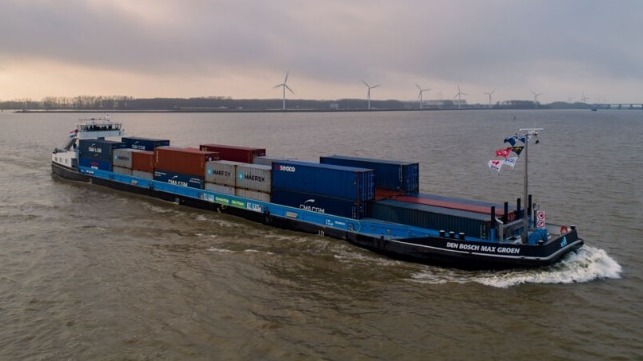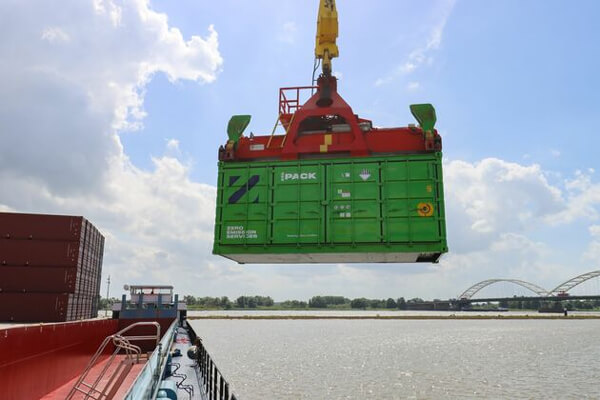Inland Cargo Ship Will Use Swappable Battery System for Zero Emissions

The first inland cargo vessel running entirely on a new swappable battery system to achieve zero emission operations is set to launch in the spring of 2024 in the Netherlands. It is the latest in a series of steps being taken by Europe’s vital inland shipping industry to take the lead in decarbonization.
The 295-foot vessel Den Bosch Max Groen owned by Nedcargo and operated in partnership with inland terminal operator BCTN, is currently undergoing a conversion at the Concordia Damen shipyard which also built the vessel in 2020. Originally operating with a diesel motor, the vessel however was designed for electric drive. The diesel generator is being removed and replaced with a system that will be powered by a standard 20-foot modular energy container, batteries that will be swapped out as the vessel sails.
Known as ZESpacks, the batteries are self-contained and designed to be loaded onto the ships and then swapped out after the power is expended. Zero Emission Services (ZES) is building a strategically placed network of 1 MW charging stations where the batteries can be recharged in three hours. The vessels, however, instead of waiting for the recharge swap out the units to continue operations. ZES is also providing the system with a unique pay-per-use billing model.
The Den Bosch Max Groen is scheduled to re-enter service in April 2024 as the first vessel to operate solely using a second generation of the battery power system. ZES reports the new version of the system provides more power and a better power connection. ZES was launched in 2020 as a partnership between the Port of Rotterdam Authority, financial giant ING bank, energy and technical service provider ENGIE, and maritime technology company Wärtsilä. The first demonstrations of the ZESpack system were carried out in 2021.

ZESpack is a standard 20-foot modular energy container swapped out to power the inland cargo vessels (Port of Rotterdam)
The Netherlands’ National Growth Fund is providing €50 million for the development of the infrastructure, which will include a charging station at the BCTN terminal in Alblasserdam, which will be operational in the first quarter of 2024 and will be followed by charging stations in Rotterdam as well as Den Bosch and Moerdijk. I&W Greendeal is also assisting with a subsidy to Nedcargo for the costs of the ship conversion. They plan to convert a total of five inland cargo vessels to the battery power system.

that matters most
Get the latest maritime news delivered to your inbox daily.
The ship operates between Rotterdam and Den Bosch primarily carrying containers and cargo for Heineken. With a capacity of 132 TEU, it was designed at the maximum size to fit through the locks on the Dieze Canal while also maximizing cargo capacity. Nedcargo reports it ships around 2.5 billion bottles of Heineken beer to the ports of Rotterdam and Antwerp each year. The conversion to the battery system is expected to reduce emissions annually by approximately 715 tonnes of CO2 and 13 tonnes of NOx.
